
Spielwarenmesse 2023: I was there! Part 1
Who are the people who are enthusiastic about the toy industry and make the Spielwarenmesse the event of the year? What did they want to discover at Spielwarenmesse 2023 in Nürnberg? Meet them in our visitor portraits captured for us by Peter Budig.
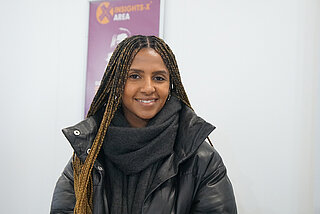
Hani Omilani from Lagos, Nigeria
Hani Omilani grew up in Frankfurt Main in Germany. She attended schools and university (Master’s degree in International Business) in Great Britain and currently lives in Lagos, Nigeria’s largest city with a population of over 14 million people, together with her family. She has been managing her own toy, fashion, and gift shop – Tinko Toys – for a good two years now. She sells to both in-shop customers as well as to the trade. When she took over the shop, it was already established under the name Going Bananas Lagos and featured quality toys that usually originated from France. She expanded the store by an online shop and now intends to broaden the product range with quality toys – especially from Germany. Omilani is in Nuremberg for the first time. “Lagos is a huge market for toys. There are just so many children. And Nigerians love to gift presents to their children. But toys are practically sold at street markets only, where cheap plastic products tend to be available. My offer is unique and in great demand. I believe that the market is far from being exhausted.”
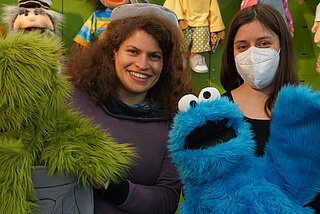
Ariane Bernecker from Göttingen, Germany
Ariane Bernecker has a Master’s degree in geography. While applying for relevant jobs, “Mrs Adler from the kite store in Göttingen asked me if I wanted to take over her shop”, she recalls, laughing. She had been working there on the side during her studies. Today, she has been the owner of the store which was founded in 1984 for four years. Even before taking over the business, the product range consisting of kites and acrobatic equipment was supplemented by toys and board games. We are meeting with her at the Living Puppets booth where she is testing one of the huge hand puppets. “They are very popular and are bought by teachers, coaches, therapists and naturally, families with children”, she explains. The Spielwarenmesse allows her to gain an overview of the market, view new products and finalise business.

Oliver Forrer and Oliver Forrer from St. Gallen in Switzerland
A day out with the family: Father and son are both called Oliver Forrer and arrived with the wife and sister. They have two businesses in St. Gallen – a wholesale trade for promotional items and toys – creanorm polypins – as well as a special shop for model railways and their repair, etc. named ZUBA-TECH. The father is a regular at the Spielwarenmesse and is thrilled to have made two new contacts this Thursday evening: “We needed to make up ground in the soft toy segment and found an excellent producer and a retailer offering a selection of especially beautiful dolls. The trade fair is indispensable for us, and has been for 15 years”, Forrer Senior adds.
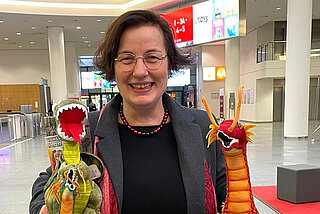
Prof. Karin Falkenberg from Nuremberg, Germany
Karin Falkenberg is the head of the Nuremberg Toy Museum which has a booth at the trade fair. She also explores the halls on all days of the fair. Her enthusiasm knows no boundaries: “You will find that something is happening here that is impossible to create intentionally. Games as our cultural heritage and toys as merchandise fuse to spontaneously add value. This energy creates a space for chance encounters and hence there are surprising meetings and an exchange of the highest quality. It’s simply great.“

Tobias Wagner from Bochum, Germany
Tobias Wagner and his employee, Dana Walm are celebrating at the booth of Schmidt Spiele during the Red Night event staged by Spielwarenmesse on Thursday evening. Together, they comb through the halls for Spielzeug-Paradies Wagner, a paradise for toys located on Dr.-Ruer-Platz in Bochum which has over 1,000 square metres of in-store space. This second-generation store has been in business for 20 years. For a long time, it was specialised in railway models and plastic models. Its product assortment last also included other toys and quality board games produced by smaller game publishers. “We have a solid schedule here and have appointments by the hour for the full five days”, says Tobias Wagner. “I have noticed that post-Covid, people seem to be more open and that they appreciate the opportunity to engage in a personal exchange more than before”, Dana Walm adds. Even though they don’t have a lot of time, they also use the tour of the fair to cultivate their passion for toys: “A toy store is not just something to make money with – you do this because it’s your passion. This is where I can take new products into my hands, try them out or talk to the designer of a board game. You don’t get this sort of experience on social media platforms”, Wagner says, already on his way out.
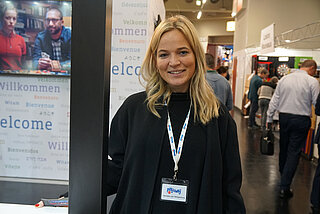
Hanneke van Willigenborg from Amsterdam, Netherlands
Hanneke van Willigenborg handels Warner Bros. and Mattel licenses for Nordic Licensing from Denmark. The business economist arrives in Nuremberg from her Amsterdam-based office. She meets with all her relevant clients, licensees and resellers from Northern Europe and Belgium with whom she arranged appointments beforehand. She remains throughout the entire duration of the Spielwarenmesse fair on location. She uses the little free time she has to obtain a general overview of the market and the relevant brands.
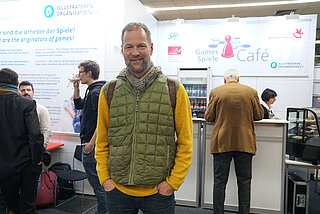
Heinrich Roskothen from Duisburg, Germany
Heinrich Roskothen and his Duisburg-based toy store, The Art of Playing (Die Kunst zu spielen) is a legend in the toy industry. The shop was formed in 1879 and Heinrich has been managing it as a family member for 25 years. His homepage tells us why. THE ART OF PLAYING: “Whether you want to create wonders of the world as an architect or explore galaxies as a space traveller; whether you dream of being the frog or the princess, or fancy yourself building castles from chocolate or lighting up the skies with a message written in flames; whether you want to be a giant even though you’re still little, or a child even though you’re all grown up – you have come to the right place. Born to be child.” They are board game experts, especially for the extravagant kind, but have expanded their range to include cookbooks, cooking accessories, and beautiful things for gifting. “I was born in 1965 and went to the fair in Nuremberg for the first time when I was 14 years old. At the time too young, they had to smuggle me onto the grounds, Roskothen tells us. “This trade fair is still the toy industry’s big get-together,” he says. “This is where you meet them all and liaise. You are also given plenty of wonderful inspiration and ideas for new things. A shop like this also lives on the surprises it can create”, so his personal résumé of the trade fair.
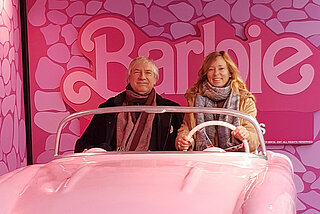
Prof. Ulrich Schädler from La Tour-de-Peilz, Switzerland
Ulrich Schädler has a doctoral degree in archaeology and has been running the unique Swiss Museum of Games since 2002: This games-only museum is based in a 13th century castle in the 12,000-resident municipality of La Tour-de-Peilz directly on the North-Eastern banks of Lake Geneva and offers a breath-taking view of the lake. He has been a regular guest of the Spielwarenmesse since around about 2006. “Naturally, a museum’s curator must cultivate his network, especially if, like me, he has been tied closely to the game scene since his days as a student. That can be done perfectly here. I tend to look around with a pragmatic view of what I could add to the museum shop, and I believe to have found something”, so his report.

